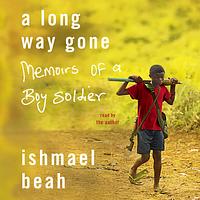Take a photo of a barcode or cover
One of the hardest books I've read, but also important and not a topic that can be ignored. I couldn't keep from thinking, "He was Zac's age (13) when all this happened to him!" It is amazing to read about and celebrate the resilience of the author's spirit, and I love that he has persevered in his mission to keep this story from becoming that of other boys around the world. But I couldn't help wondering about all those boys who never healed from their time as boy soldiers, or never survived it.
Very good book.
This is a difficult subject but the writing is approachable. While Ishmael Beah addresses his time as a child soldier, that is not the focus or the major part of the book.
Instead he focuses on his time before and his healing journey after leaving the army.
This book is surprisingly gentle and rich with compassion. While it is sometimes difficult to read the details, overall this is a reflection on the power of redemption.
This is a difficult subject but the writing is approachable. While Ishmael Beah addresses his time as a child soldier, that is not the focus or the major part of the book.
Instead he focuses on his time before and his healing journey after leaving the army.
This book is surprisingly gentle and rich with compassion. While it is sometimes difficult to read the details, overall this is a reflection on the power of redemption.
The United States is a very fragile place. Sure, everyone around the world (supposedly) wants to move there, and there's no lie regarding how much money it produces compared to many a country (although you'd have a hard time being able to tell that based on infrastructure alone), but if you've read anything in the line of Klein's [b:The Shock Doctrine|1237300|The Shock Doctrine The Rise of Disaster Capitalism|Naomi Klein|https://i.gr-assets.com/images/S/compressed.photo.goodreads.com/books/1442590618l/1237300._SY75_.jpg|2826418], you know where those money trails tend to lead and the how interconnected said money is with various paths of immigration/brain drain. Having done such connecting of the dots myself in the years between adding this particular book and finally getting around to reading it, I look at this book and marvel at how poorly it sustains itself compared to the typical work of nonfiction one would be allowed to cite in an academic paper. Add in the controversy over the credibility that's not entirely conservative fearmongering, and you have a piece with too many holes in the main text and too much shoehorning in of an awfully Anglo-centric timeline at the end for me to rate this any more highly than I have. Perhaps, one of these days, Sierra Leone and its associated nations will be able to conduct its war and peace on its own terms, the "first world nations" that once wound it up and watch it run having nuked each other into oblivion. Until then, I really can't see this as anything other than yet another piece of work that, when it comes to the US, keeps the folks at home complacent and status quo in power.
If you want a lesson in the nature of 'truth', look at what gets paragraph long footnotes and what is allowed to slide by on a minimum of context and the maximum of assumption. Beah's Sierra Leone is one of African American rap and Muslim spiritual practices, but good luck if you wanted to find out anything about the context of that in the midst of British colonies and successive coups. Probe too much, and you'll get the spiel of Beah being a child in a horrifically traumatizing time and thus not in any way behooved to deliver a holistic rendition of his past whilst doing his best to recover. Understandable, but so long as works like these are the ones that make the eternal lists of higher popularity, it's obvious that the public doesn't truly care about making sure such events and their causalities never come about again. Otherwise, they might be a tad more curious about why there is such simmering resentment in the population, how a country's infrastructure remains so prone to society wide collapse in the late 20th century, who is being kept in such mass disenfranchised states that there is a ready pool to render bloodthirsty with a few machine guns and the slightest sprinkle of drugs, rather than simply condemn entire countries to their seeming doom. Unfortunately, that doesn't sell TED talk tickets or flood the coffers of NGOs, and if you think that's overtly cynical, you should ask yourself what Sierra Leone authors you've read other than Beah, and if that number is zero, ponder a moment who is truly cynical.
If you've reached the end of this review wondering about that Sierra Leone author who isn't Beah, you can start with [a:Aminatta Forna|63640|Aminatta Forna|https://images.gr-assets.com/authors/1258560635p2/63640.jpg] and let me know of any who were born on native soil. Lord knows the US is the butt of the jokes centering around poor knowledge of geography, but considering how often the countries known are the centers of occupation and various other incarnations of disaster capitalism, one could argue that it's in the wider world's best interest to keep the typical citizen of the land of the free and the home of the brave as ignorant as possible. In any case, this work is over and done with, and I'd feel a lot more comfortable feeling the same level of indignant fury and/or heartfelt amazement if I didn't see Beah's successors and Sierra Leone's descendants preceding into an infinity of a future so long as there's money to be made off of the principles of greed and schadenfreude. Never again, one says, but so long as the solution to instability is to put more ruthless attack dogs with little accountability and no compassion on the ground, there will always be an again, whether it is in a far off country of a far off continent or amidst the protest grounds of the White House. Beah made it out to tell his tale, but what good does it do Sierra Leone in the long run to see its brightest rush off into the arms of a country for whom the destabilization of the rest of the world is in its best interests? I don't have the answers, but said answers will never appear so long as everyone is looking in the wrong direction.
If you want a lesson in the nature of 'truth', look at what gets paragraph long footnotes and what is allowed to slide by on a minimum of context and the maximum of assumption. Beah's Sierra Leone is one of African American rap and Muslim spiritual practices, but good luck if you wanted to find out anything about the context of that in the midst of British colonies and successive coups. Probe too much, and you'll get the spiel of Beah being a child in a horrifically traumatizing time and thus not in any way behooved to deliver a holistic rendition of his past whilst doing his best to recover. Understandable, but so long as works like these are the ones that make the eternal lists of higher popularity, it's obvious that the public doesn't truly care about making sure such events and their causalities never come about again. Otherwise, they might be a tad more curious about why there is such simmering resentment in the population, how a country's infrastructure remains so prone to society wide collapse in the late 20th century, who is being kept in such mass disenfranchised states that there is a ready pool to render bloodthirsty with a few machine guns and the slightest sprinkle of drugs, rather than simply condemn entire countries to their seeming doom. Unfortunately, that doesn't sell TED talk tickets or flood the coffers of NGOs, and if you think that's overtly cynical, you should ask yourself what Sierra Leone authors you've read other than Beah, and if that number is zero, ponder a moment who is truly cynical.
If you've reached the end of this review wondering about that Sierra Leone author who isn't Beah, you can start with [a:Aminatta Forna|63640|Aminatta Forna|https://images.gr-assets.com/authors/1258560635p2/63640.jpg] and let me know of any who were born on native soil. Lord knows the US is the butt of the jokes centering around poor knowledge of geography, but considering how often the countries known are the centers of occupation and various other incarnations of disaster capitalism, one could argue that it's in the wider world's best interest to keep the typical citizen of the land of the free and the home of the brave as ignorant as possible. In any case, this work is over and done with, and I'd feel a lot more comfortable feeling the same level of indignant fury and/or heartfelt amazement if I didn't see Beah's successors and Sierra Leone's descendants preceding into an infinity of a future so long as there's money to be made off of the principles of greed and schadenfreude. Never again, one says, but so long as the solution to instability is to put more ruthless attack dogs with little accountability and no compassion on the ground, there will always be an again, whether it is in a far off country of a far off continent or amidst the protest grounds of the White House. Beah made it out to tell his tale, but what good does it do Sierra Leone in the long run to see its brightest rush off into the arms of a country for whom the destabilization of the rest of the world is in its best interests? I don't have the answers, but said answers will never appear so long as everyone is looking in the wrong direction.
Although the book had a decent ending and a few quote-worthy dialogues, it is repetitive and drags many unnecessary things. Additionally, too many pointless flashbacks and details were shoved into the story... which really tested my patience.
It took everything in me to read through the rest of the story. After reading the book, I felt like I didn't learn anything. I didn't feel anything, either. Sure, many people experienced plenty of traumatic events during the book-- however, compared to other books such as 'Night' by Elie Wiesel, this just felt like an honest waste of my time.
Of course, not to say that Beah's experience was not terrifying and scarring, but the story was honestly too dry.
It took everything in me to read through the rest of the story. After reading the book, I felt like I didn't learn anything. I didn't feel anything, either. Sure, many people experienced plenty of traumatic events during the book-- however, compared to other books such as 'Night' by Elie Wiesel, this just felt like an honest waste of my time.
Of course, not to say that Beah's experience was not terrifying and scarring, but the story was honestly too dry.
dark
emotional
informative
sad
tense
fast-paced
The 10th grade English kids read this for class, and it was new to me. Several sections were difficult to read due to the subject matter. 12 year olds as soldiers functioning on a cocktail of stimulant and depressive drugs is not a comfortable read, but memoirs like this one help spotlight what is happening beyond the borders of our country. The hope is we will apply this to our daily lives.
A fantastic read - revealing, moving, fascinating, horrifying, intense.
Ishmael Beah takes the reader on a journey through his unfathomable childhood. The book is a difficult read, but ultimately inspiring. His story illustrates how children are drawn into a bloody civil war and shows the reader that there is hope for redemption. It illustrates the human toll dysfunctional political conflicts and civil wars take on a country.





